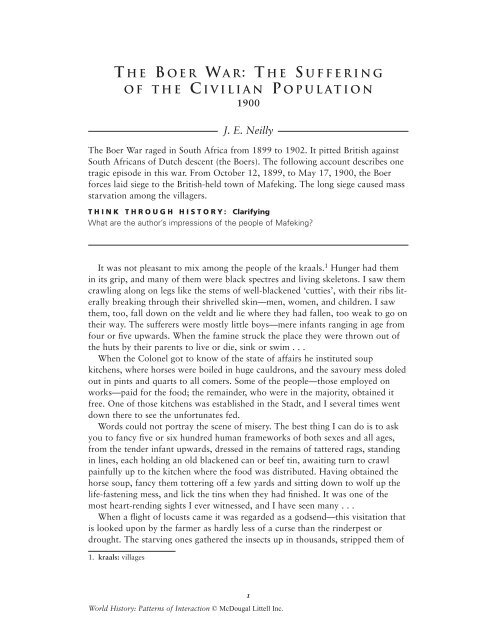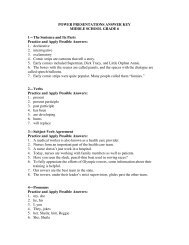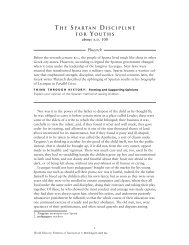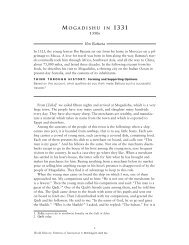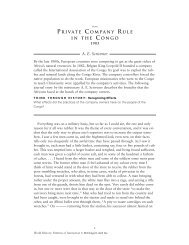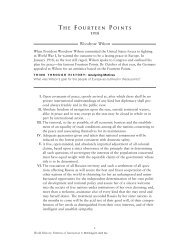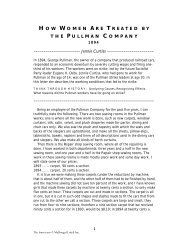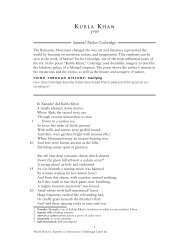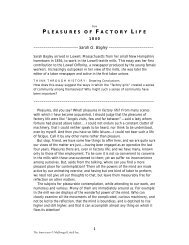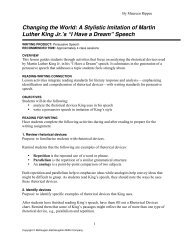th e suffering - ClassZone
th e suffering - ClassZone
th e suffering - ClassZone
Create successful ePaper yourself
Turn your PDF publications into a flip-book with our unique Google optimized e-Paper software.
T HE BOER WAR: THE SUFFERING<br />
OF THE CIVILIAN POPULATION<br />
1900<br />
J. E. Neilly<br />
The Boer War raged in Sou<strong>th</strong> Africa from 1899 to 1902. It pitted British against<br />
Sou<strong>th</strong> Africans of Dutch descent (<strong>th</strong>e Boers). The following account describes one<br />
tragic episode in <strong>th</strong>is war. From October 12, 1899, to May 17, 1900, <strong>th</strong>e Boer<br />
forces laid siege to <strong>th</strong>e British-held town of Mafeking. The long siege caused mass<br />
starvation among <strong>th</strong>e villagers.<br />
THINK THROUGH HISTORY: Clarifying<br />
What are <strong>th</strong>e au<strong>th</strong>or’s impressions of <strong>th</strong>e people of Mafeking?<br />
It was not pleasant to mix among <strong>th</strong>e people of <strong>th</strong>e kraals. 1 Hunger had <strong>th</strong>em<br />
in its grip, and many of <strong>th</strong>em were black spectres and living skeletons. I saw <strong>th</strong>em<br />
crawling along on legs like <strong>th</strong>e stems of well-blackened ‘cutties’, wi<strong>th</strong> <strong>th</strong>eir ribs literally<br />
breaking <strong>th</strong>rough <strong>th</strong>eir shrivelled skin—men, women, and children. I saw<br />
<strong>th</strong>em, too, fall down on <strong>th</strong>e veldt and lie where <strong>th</strong>ey had fallen, too weak to go on<br />
<strong>th</strong>eir way. The sufferers were mostly little boys—mere infants ranging in age from<br />
four or five upwards. When <strong>th</strong>e famine struck <strong>th</strong>e place <strong>th</strong>ey were <strong>th</strong>rown out of<br />
<strong>th</strong>e huts by <strong>th</strong>eir parents to live or die, sink or swim . . .<br />
When <strong>th</strong>e Colonel got to know of <strong>th</strong>e state of affairs he instituted soup<br />
kitchens, where horses were boiled in huge cauldrons, and <strong>th</strong>e savoury mess doled<br />
out in pints and quarts to all comers. Some of <strong>th</strong>e people—<strong>th</strong>ose employed on<br />
works—paid for <strong>th</strong>e food; <strong>th</strong>e remainder, who were in <strong>th</strong>e majority, obtained it<br />
free. One of <strong>th</strong>ose kitchens was established in <strong>th</strong>e Stadt, and I several times went<br />
down <strong>th</strong>ere to see <strong>th</strong>e unfortunates fed.<br />
Words could not portray <strong>th</strong>e scene of misery. The best <strong>th</strong>ing I can do is to ask<br />
you to fancy five or six hundred human frameworks of bo<strong>th</strong> sexes and all ages,<br />
from <strong>th</strong>e tender infant upwards, dressed in <strong>th</strong>e remains of tattered rags, standing<br />
in lines, each holding an old blackened can or beef tin, awaiting turn to crawl<br />
painfully up to <strong>th</strong>e kitchen where <strong>th</strong>e food was distributed. Having obtained <strong>th</strong>e<br />
horse soup, fancy <strong>th</strong>em tottering off a few yards and sitting down to wolf up <strong>th</strong>e<br />
life-fastening mess, and lick <strong>th</strong>e tins when <strong>th</strong>ey had finished. It was one of <strong>th</strong>e<br />
most heart-rending sights I ever witnessed, and I have seen many . . .<br />
When a flight of locusts came it was regarded as a godsend—<strong>th</strong>is visitation <strong>th</strong>at<br />
is looked upon by <strong>th</strong>e farmer as hardly less of a curse <strong>th</strong>an <strong>th</strong>e rinderpest or<br />
drought. The starving ones ga<strong>th</strong>ered <strong>th</strong>e insects up in <strong>th</strong>ousands, stripped <strong>th</strong>em of<br />
1. kraals: villages<br />
World History: Patterns of Interaction © McDougal Littell Inc.<br />
1
The Boer War: The Suffering of <strong>th</strong>e Civilian Population<br />
<strong>th</strong>eir heads, legs, and wings, and ate <strong>th</strong>e bodies. They picked up meat-tins and<br />
licked <strong>th</strong>em; <strong>th</strong>ey fed like outcast curs. They went far<strong>th</strong>er <strong>th</strong>an <strong>th</strong>e mongrel. When<br />
a dog gets a bone he polishes it white and leaves it <strong>th</strong>ere. Day after day I heard<br />
outside my door continuous <strong>th</strong>umping sounds. They were caused by <strong>th</strong>e living<br />
skeletons who, having eaten all <strong>th</strong>at was outside <strong>th</strong>e bones, smashed <strong>th</strong>em up wi<strong>th</strong><br />
stones and devoured what marrow <strong>th</strong>ey could find. They looked for bones on <strong>th</strong>e<br />
dust-heaps, on <strong>th</strong>e roads everywhere, and I pledge my word <strong>th</strong>at I saw one poor<br />
fellow weakly follow a dog wi<strong>th</strong> a stone and wi<strong>th</strong> unerring aim strike him on <strong>th</strong>e<br />
ribs, which caused <strong>th</strong>e lean and hungry brute to drop a bone, which <strong>th</strong>e [black]<br />
carried off in triumph to <strong>th</strong>e curb, where he smashed it and got what comfort he<br />
could from it.<br />
Source: “Besieged wi<strong>th</strong> Baden-Powell” by J. E. Neilly, 1900.<br />
World History: Patterns of Interaction © McDougal Littell Inc.<br />
2


